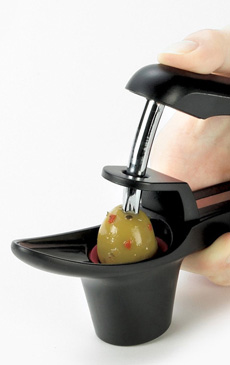TIP OF THE DAY: Get An Olive Pitter (And A Cherry Pitter As A Bonus)
|
A year ago we wrote about kitchen gadgets to avoid. Some, like the mango pitter, turned out to be a waste of space and money—they work only on perfectly-shaped mangoes.
Others, like a garlic press, an egg separator, a mandoline, an egg slicer and a cherry- or olive-pitter make difficult jobs easy. With olives and cherries, you get a two-for-one gadget: The same pitter works with each. (Food fact: when used for cherries, it’s called a stoner, since cherries have stones, not pits.*) If you’ve ever bitten into a plump olive in a salad, sauté or stew—only to crunch down on the pit—you’ll recognize why you need one of these gadgets. A few olives add lots of flavor to dishes—at least, the really good olives, which usually are not pitted by the manufacturer, do. The pitted, canned variety are very bland, adding color but not flavor. With all due respect to the people who enjoy mild olives, we choose olives for their bite. |
 A Cherry/Olive Pitter from Cuisipro. |
|
|
Get an olive pitter and you’ll find new ways to use olives: sliced into scrambled eggs and omelets, in the nongreen salad group (chicken, egg, macaroni and potato salads, plus others), in pasta and on pizza, with baked fish, roasted vegetables, polenta….just about anything. (There‘s a treasure trove of olive-based recipes at LindsayOlives.com.) Try them in an avocado and grapefruit salad or a blood orange and arugula salad. You can also have fun stuffing the centers of the olives with something unexpected—like pineapple slivers, or an olive-chive garnish (with the ends of the chives sticking out of each end of the olive). And plan ahead for cherry season (May to July for U.S. cherries). |
||